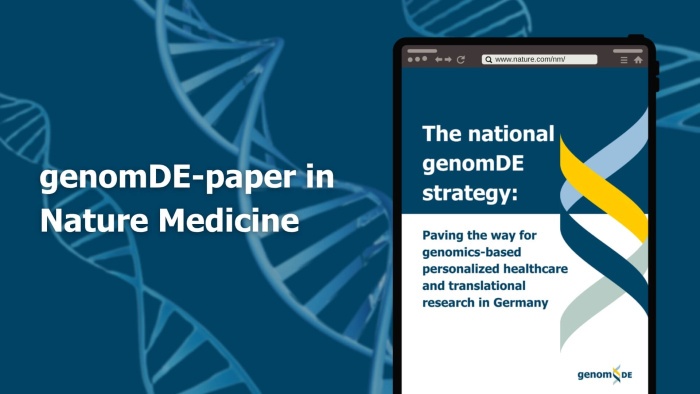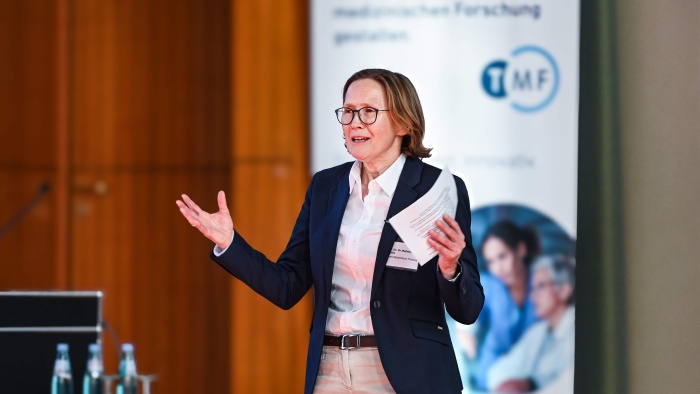Genomic Medicine Enters Healthcare: Bundesrat Decision Paves the Way for Model Project on Genome Sequencing
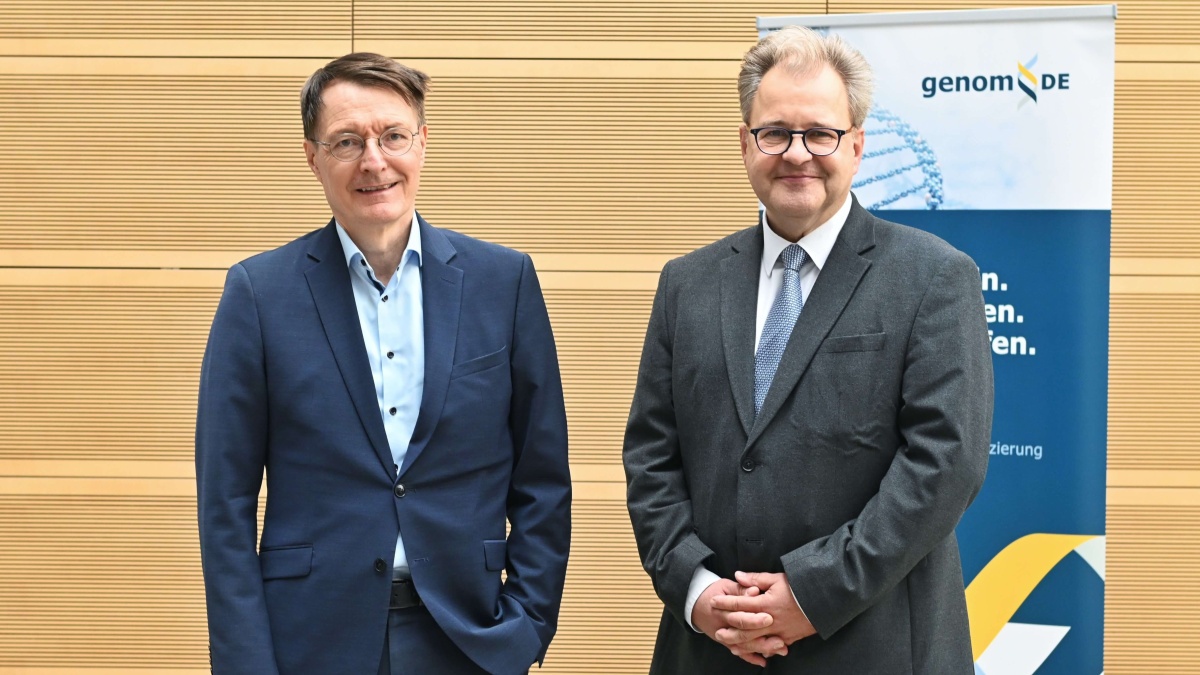
Federal Minister of Health Prof. Dr. Karl Lauterbach and the TMF’s Managing Director Sebastian Claudius Semler. © TMF
On July 5, 2024, the Bundesrat (Federal Council) approved the regulation for the pilot project on comprehensive diagnostics and therapy findings through genome sequencing for rare and oncological diseases (Genome Data Regulation - GenDV). This pilot project is now entering the implementation phase at the involved clinical centers. Over a period of five years, starting in July, genome sequencing will be uniformly provided nationwide for patients with cancer and rare diseases. The services in the pilot project will be funded by statutory health insurance with 700 million euros. The TMF - Technology and Methodology Platform for Networked Medical Research coordinates the BMG-funded conceptual project genomDE, which prepares and accompanies the implementation of the pilot project. A legally mandated evaluation after the five-year period will show where the benefits lie and how the transition to standard care can take place.
"We are ready today to bring genomic medicine into healthcare," announced Federal Health Minister Prof. Karl Lauterbach at the opening of the 3rd genomDE symposium in Berlin. "Years of pioneering work in our flagship initiatives in genomic medicine have made it possible for patients nationwide to benefit from genome sequencing and personalized therapy recommendations," Lauterbach emphasized. "This can significantly improve the survival of cancer patients."
A key component of the pilot project is its evaluation. Lauterbach stated: "Only through a positive evaluation can we demonstrate the evidence of this form of care and take the next step toward standard care. I am convinced that our results will also influence developments at the European and international levels." Genomic medicine uses sequencing information for genetic diagnostics and clinical interpretation of individual genetic information. It allows diagnoses to be made faster and more precisely and helps doctors select the optimal preventive measures and therapies. The resulting healthcare data can provide more answers in the analysis of the genome, which was previously not possible.
This is especially true for rare diseases, helping to shorten years of diagnostic search. In oncology, it provides therapy options that may go beyond guideline therapies. It can also help better understand familial tumor diseases, according to the Federal Health Minister.
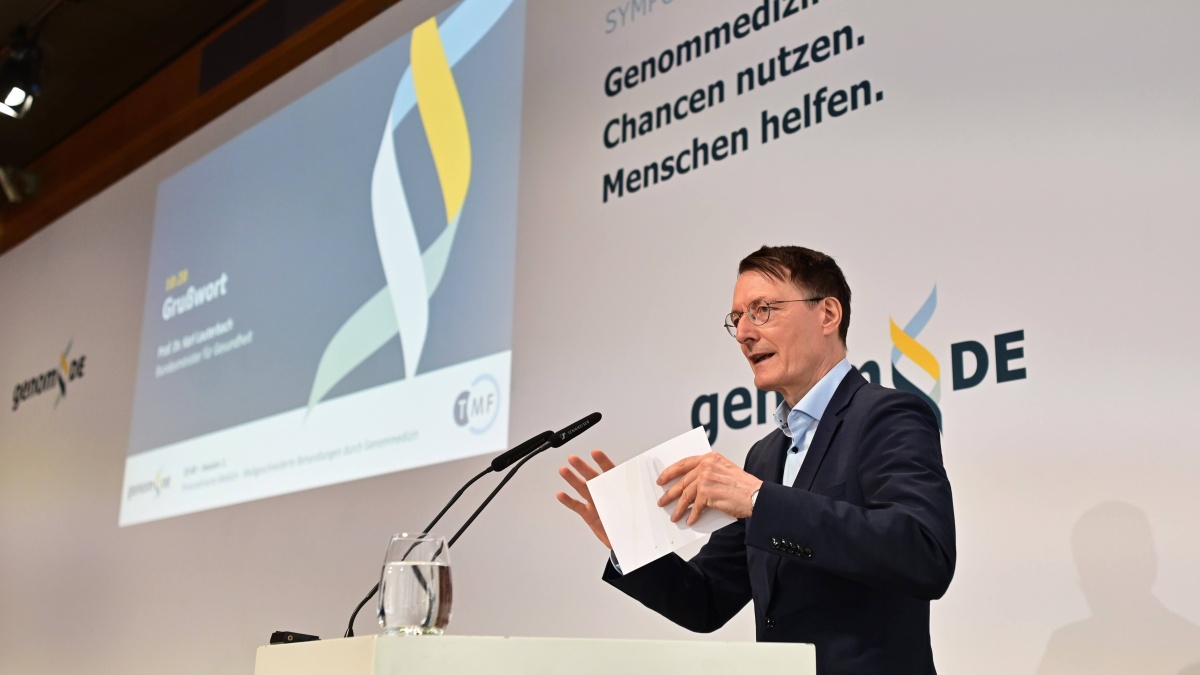
Federal Health Minister Prof. Karl Lauterbach at the opening of the genomDE Symposium 2024 in Berlin. © TMF
Only through a positive evaluation can we demonstrate the evidence of this form of care and take the next step toward standard care.
The Federal Ministry of Health initiated the genomDE project in October 2021, integrated it into the National Strategy for Genomic Medicine, and established the legal framework for the pilot project on genome sequencing. On April 1, 2024, the pilot project for comprehensive diagnostics and therapy findings through genome sequencing for rare and oncological diseases commenced.
The regulation for the pilot project, which was adopted on July 5, 2024, outlines the implementation details for data processing, technical design, and the scope of data in the context of the genome sequencing pilot project based on § 64e of the Fifth Book of the Social Code (SGB V). The pilot project enables knowledge-generating care, where the collected data can be used both for healthcare and research. Additionally, it connects national structures and top-tier healthcare in the field of genomic medicine. The current top medical centers will be expanded to include additional university hospital locations, ensuring that the pilot project can be offered at uniform standards nationwide in more university-based centers.
The federal government finances the genome computing centers and clinical data nodes and provides the necessary data infrastructure through the Federal Institute for Drugs and Medical Devices (BfArM) as the platform operator and the Robert Koch Institute (RKI) as the trusted body.
One of the greatest challenges was creating a solution for interoperability and a unified data set. "That you've succeeded in this will set standards in genomic medicine both nationally and internationally!" Lauterbach addressed the community. With knowledge-generating care, data from healthcare leads to the latest insights, benefiting innovative diagnostics and therapy recommendations.
"For understanding genetic influences on health, we rely on the meaningful linking of data and secure data exchange. Genomic medicine will thus become even more important in the future for the care of patients. The genomDE project has already made a significant contribution to leading healthcare and research into the future," emphasized Matthias Mieves, a Member of the German Bundestag, SPD spokesperson for e-health, and a member of the Health and Digital Committees in the Bundestag at the symposium.
The genomDE project has already made a significant contribution to leading healthcare and research into the future.
An additional highlight was the premiere of the genomDE explainer film. This combines live-action interviews with an animation that clearly explains the key information about genomic medicine and genome sequencing.
Sebastian C. Semler, Managing Director of the TMF and head of the genomDE coordination office at the TMF, expressed his joy over the great response to this year’s symposium:
“This year’s symposium was a great success. Interest in genomic medicine is increasingly being recognized, not only within the professional community but also by patients and other stakeholders. The genomDE project has developed into a significant platform, and we hope that with many players, so to speak, a ‘Team Genomic Medicine in Germany,’ we can continue to advance this field and establish connections with European research infrastructures.”
About the Pilot Project Genome Sequencing
The Pilot Project Genome Sequencing (officially titled "Pilot Project for Comprehensive Diagnostics and Therapy Finding Using Genome Sequencing for Rare and Oncological Diseases," as per § 64e SGB V) is the core of the National Strategy for Genomic Medicine and will help integrate genomic medicine into healthcare in Germany.
For more detailed information about the Pilot Project Genome Sequencing, visit the BfArM website.
Press Contact
Christine Fechner
TMF – Technology and Methodology Platform for Networked Medical Research Press & Public Relations genomDE
Charlottenstraße 42, 10117 Berlin
Tel: +49 (0) 30 − 22 00 24 769
Email: presse@tmf-ev.de
Further Information
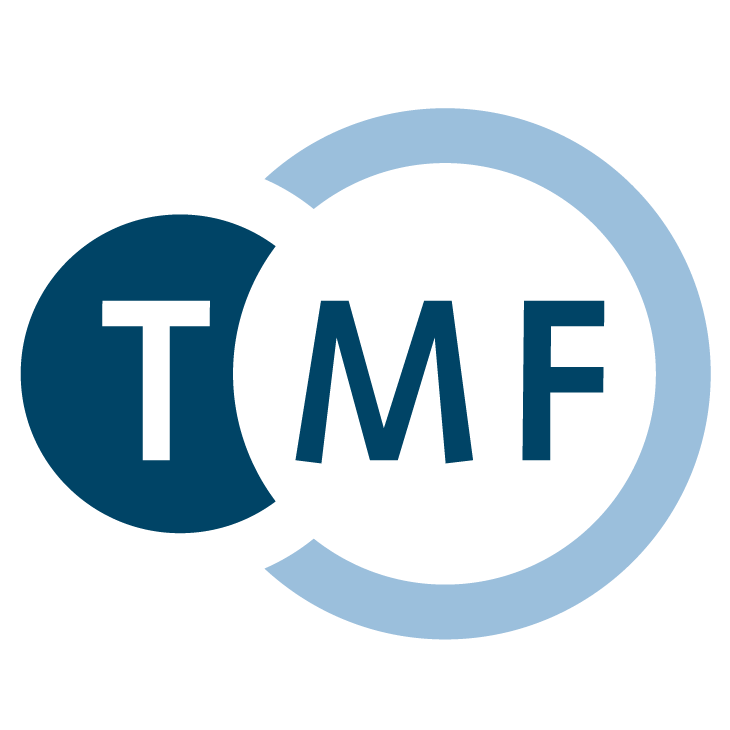
About the TMF e.V.
The TMF is the umbrella organization for networked medical research in Germany. It is the platform for interdisciplinary exchange as well as cross-project and cross-location cooperation in order to identify and solve the organizational, legal/ethical and technological problems of modern medical research. Solutions range from expert opinions, generic concepts, and IT applications to checklists, practical guides, training, and consultation services. The TMF makes these solutions available to the public free of charge.
